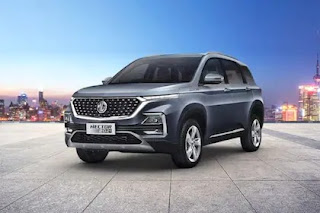How MG Astor is setting the course to turn Indian cars into Luxury
The MG Astor is poised to become the first affordable car in India to support Level 2 autonomous driving. Apart from smart driving, the Astor is also different from most cars on Indian roads as it aims to transform a car into a service that allows startups and app makers to use data collected by the vehicle itself.
In an interview with TechCircle, Rajeev Chaba, president and chief executive officer of MG Motors, said the company has been "flooded" with requests from startups that want to be "in the car". Modified Excerpts:
How do you see the concept of a car as a platform evolving in India? Are buyers changing today?
One trend that cannot be denied is that the young people of the country are very tech-savvy. They want to have seamless integrated experiences between all screens. They have a TV at home, a laptop or desktop at the office, a smartphone and a screen in their car. Millennials and Gen-Z want it to be seamless, while people with an older mindset may wonder why they need the same functionality available on their phone on their car screen. The challenge is to make this happen in a safe way so that the driver is not distracted by the features while driving. For this reason, many features are automatically disabled when you are driving the car.
In the long run, you need to work with peripheral companies to build the ecosystem. Are these companies ready for such a digital transformation?
The first thing you need is a collaborative mindset at the executive level. Even with the MG Hector, we had to collaborate with a lot of companies like TomTom for maps, Airtel for data, etc. On the Astor too, we have worked with companies like JioSaavn and Koinearth. Many players have talked to us, both public and private. There are two types of strategies - either you wait for the perfect time and the perfect solution, or you start and then evolve. We believe in the second, because otherwise you are waiting for 5G solutions for connected cars, charging stations on highways for electric cars, etc. We are getting a great response from our partners.
How are the established players, especially insurers, reacting to this trend? Are they ready to adapt?
The good news is that even in these established, mainstream, conservative companies, at least some of them understand that they need to adapt because someone is going to disrupt their industry. Also, partners like Koinearth are talking to these companies because it helps them build meaningful and impactful monetization services. In fact, some of the established names have come forward and said that they are willing to make the plans for us and they are willing to change. We launched our first car in 2019, but we started working with startups in 2017 to build our technology as a platform. We are also working with many institutes to improve the skills of our technicians and sales staff, and take care of the car whenever needed.
Autonomous or other advanced technologies have mostly been a luxury feature in Indian cars, but Astor is more affordable. Do you compromise on technology to cut costs?
No. To be clear, level 2 of autonomous driving means you have advanced driver assistance systems (ADAS) that make the driver safer. These are all safety features and your hands must always be on the wheel, but the car can help you if you are careless in the moment. For the Astor, we have worked with German, Chinese and Indian units of Bosch Mobility Solutions to ensure that the car is properly tested and there are no compromises.
However, we have to tune the features to suit Indian traffic conditions, but there are no compromises. For example, in case of emergency braking, the car will automatically stop if a car or bike comes in front of you. But if a pedestrian, bike or animal comes up next to the car without touching it, it might not beep as often, otherwise your car would be beeping constantly in Indian driving conditions.
What are the tweaks that you have made to the technology?
So, there is basically an algorithm behind every feature. To ensure 100% safety, there are conditions where certain functions do not work below or above certain speeds, or if there are glitches and distractions, a function might not work. Users also have the option to disable a feature if they do not like it. We do not just have highways in the country, so there are no perfect traffic conditions either.
How do you think regulations will affect all of this? Will it increase costs for you?
I do not see cost as an issue here. As far as data is concerned, various governments are trying to enact guidelines for data and e-commerce. Right now, compliance is a big issue for us, and we are on top of it. For example, all our data is in the Microsoft cloud in Mumbai. Also, we have partnered with L&T Technology to do cyber security audits of our car. I think regulations will also evolve over time, just like there is a global conversation about how we use socio-economic data.

Comments
Post a Comment